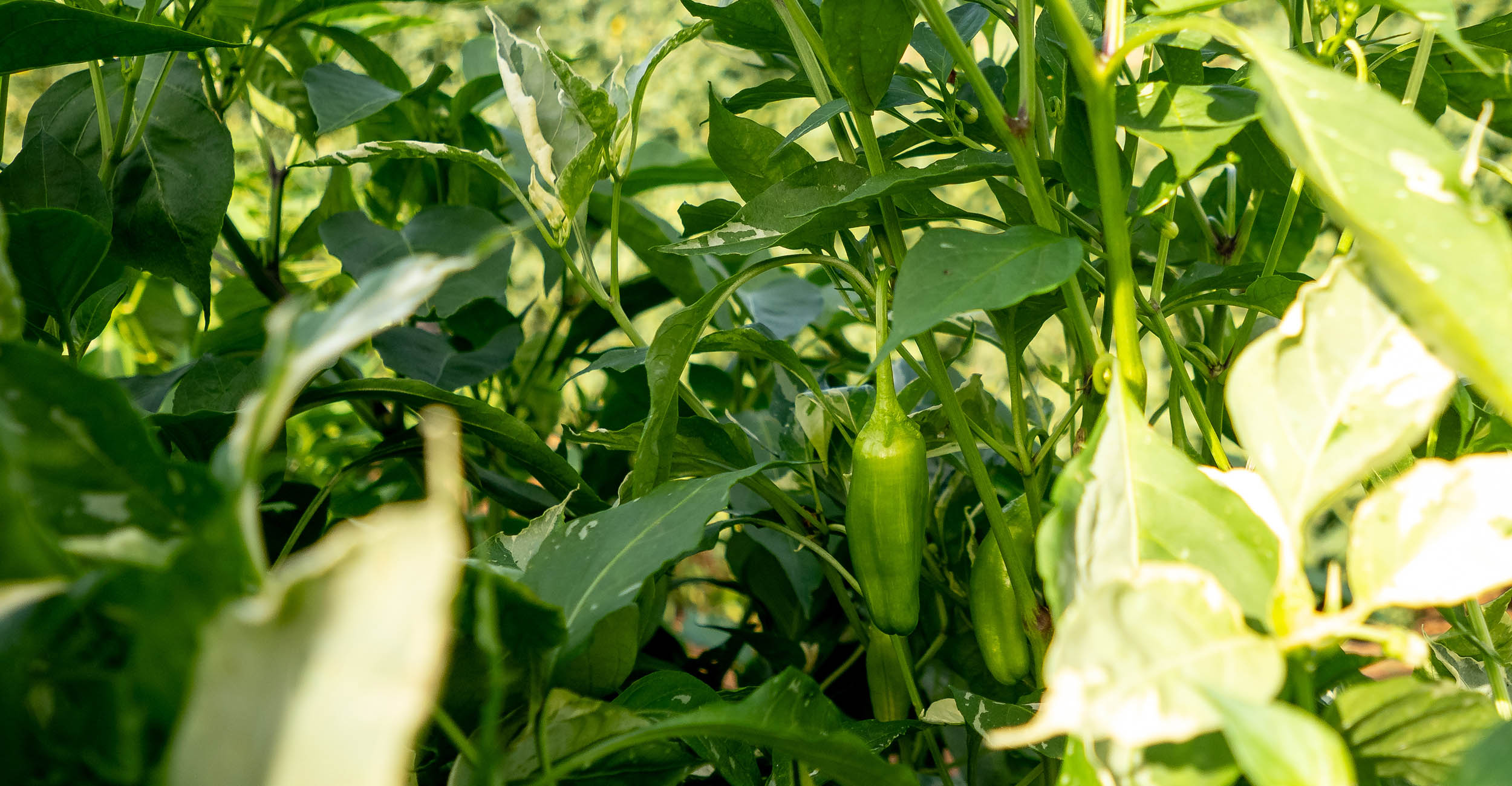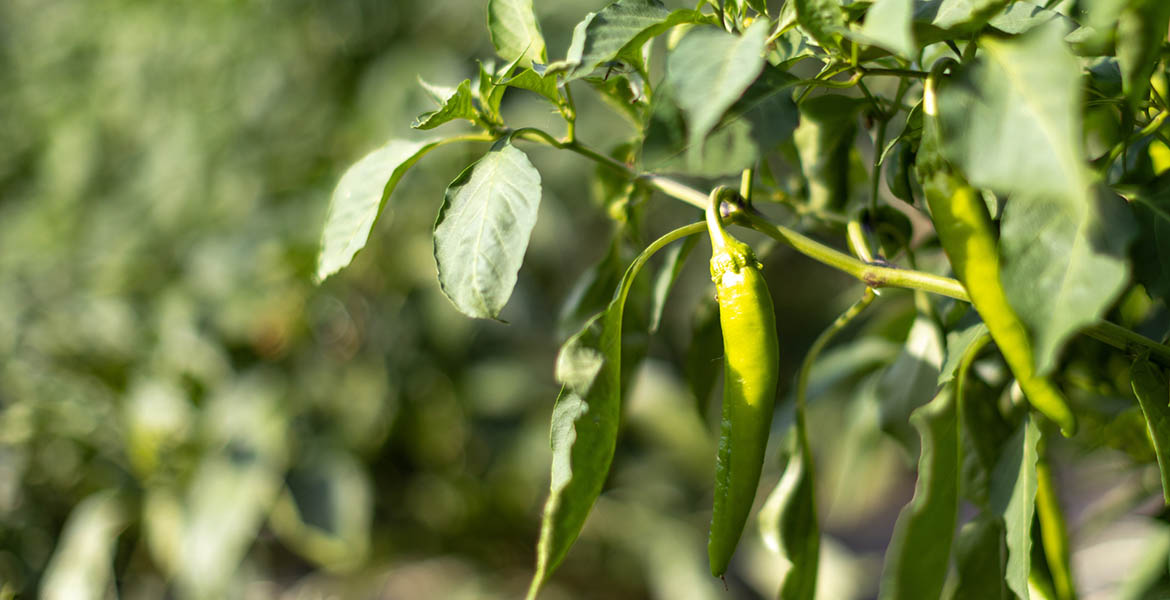
What’s hot and what’s not: Mislabeled jalapeno seeds reach gardeners nationwide
Thursday, July 20, 2023
Media Contact: Gail Ellis | Editorial Communications Coordinator | 405-744-9152 | gail.ellis@okstate.edu
Many gardeners were surprised this summer when their jalapeno plants began producing an unidentified yellow pepper.
From Michigan to Oklahoma, Facebook gardening groups flooded with hundreds of posts about the unidentified peppers that vary in flavor and heat level. It’s become known nationwide as Peppergate or Jalapenogate.
Workers at the Oklahoma State University Student Farm discovered they had planted some of the mystery seeds after their jalapeno plants began producing what resembles a type of banana pepper. Now, farm manager Lynda Carrier said some of them look more like chili peppers.
“I contacted the seed company, and they responded with an explanation that the packets are filled on semi-automatic equipment, and on very rare occasions, the wrong seed is dropped into the packet,” Carrier said.
The company provided a complimentary seeds request form to submit for replacement packets and apologized for the inconvenience. The OSU Student Farm grows and supplies vegetables to Stillwater’s food bank, Our Daily Bread, and Carrier said the peppers have been a hit with clients despite the mistaken identity.
Transparency at Sedan Floral
Wholesale plant suppliers are also fielding questions about the unknown seeds.
“I got a couple of calls about it in early June, and then it just blew up,” said Ali Cude, office manager of Sedan Floral in Sedan, Kansas. “We immediately went through our seed inventory, looked at what we ordered, what we sowed and what we have on hand.”
Sedan Floral is a third-generation family business for Cude’s husband, who graduated from OSU and returned to work at the wholesale greenhouse in 2007. It is the 74th largest greenhouse in the U.S., selling to garden centers within 500 miles. Deliveries are made to Oklahoma, Kansas, Colorado, Arkansas, Missouri, Texas and Nebraska.
“Jalapenos are such a big item for us, and banana peppers just aren’t,” Cude said. “We didn’t have enough seed to mix that up in the seed machine. It wasn’t mathematically possible.”
A call to Sedan Floral’s seed vendor indicated the seeds were sourced from a producer in California and that the problem was widespread. Cude sent an email to all of Sedan Floral’s customers that provided the vendor’s explanation, which was that some jalapeno seed packets had been mislabeled. Beyond acknowledgment of the mix-up, vendors have said little about how it could have happened.
“There are about four companies that sell seed to greenhouses our size, and two different brokers got jalapeno seed from the same source,” she said. “But different seed companies that repackage their own seed packets also fell victim to this.”
Seeds produced by a breeder are marketed by a broker to greenhouses like Sedan Floral. Mass distribution makes it difficult to identify the problem’s origin.
“All pepper seeds look the same, and when you’re buying them in packages of 25,000 seeds, you go off the label and don’t know if there’s something different in it,” Cude said.
Tracking the supply chain
In Wichita Falls, Texas, Smith’s Gardentown Farm got lucky. None of their jalapeno plants were affected, but that didn’t stop general manager Michael Fiore from doing his own research. Like Cude, he asked his seed supplier a few questions that sent him further up the supply chain.
“They traced it back to a huge, nationwide distributor,” Fiore said. “They provide seeds to multiple large brokers, and they import seeds from all over.”
His sources indicated the mislabeled jalapeno seeds came from a farm overseas.
“It’s highly probable they originated in China and were repackaged and distributed in California,” he said. “There are ways to get around trade embargoes by giving the seeds to a different company to receive them, and they label them as their own.”
Fiore’s research revealed about five companies control most of the small seeds in the world. Like a lot of monopolized industries, small businesses are often in the dark about product origin. Seeds are purchased through a broker working under a larger broker or distributor who is often owned by a larger company. Tracing back seed lineage becomes impossible, he said.
“Aside from harvesting and growing your own seeds, I’ve lost confidence in seed production. I can’t look at a seed packet on any U.S. shelf now and confidently tell you this didn’t come from overseas. These things switch hands, get relabeled, redistributed and cut up so many times.”

Fiore said this summer’s Jalapenogate has also uncovered another, more serious concern: food safety. Mislabeled pepper seeds have reached almost every corner of the U.S. in a matter of months, demonstrating how fast a product can move across the country.
“Seeing how easily the seeds were distributed across all 50 states is a little scary from a security standpoint,” he said.
Smith’s Gardentown Farm regularly sources products overseas, such as geranium seeds from El Salvador, that have their country of origin disclosed on the packaging, but seeds without a listed source may not be inspected, Fiore said.
“We’re dependent on large corporations and foreign entities,” he said. “This unravels a deeper issue of these major companies that control the entire world of seeds.”
The mystery of the season
Despite the jalapeno disappointment in gardens this year, Fiore said the potential for a jalapeno seed shortage if or when mislabeled seeds are disposed of is much lower compared to other produce that takes longer to grow, such as avocadoes.
“The good news with seed production is that it can ramp up quickly,” he said. “If you have one viable, true-to-type jalapeno, you can get 50-60 seeds out of it. You’ve got a huge multiplier effect when it comes to re-establishing the supply chain because it’s a fast turnaround time of a couple of months from seed to harvest. It takes decades to get avocado trees up to size to where they’re producing.”
Cude is still shocked at how the strange pepper plants continue to make headlines. She prioritizes transparency with her customers, and although few seed vendors have offered clear explanations, greenhouses are moving on to the fall growing season that includes mums, cabbage and kale.
“People have said they’re really good peppers,” she said. “In the grand scheme of the world, it is what it is, and a lot of people are taking it lighthearted.”
